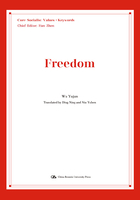
2.1 Freedom:Nature of Human Beings
There are two kinds of existence in the world:the existence of living things and that of non-living matters.The former can be further classified into human and nonhuman existence.The difference between them is that nonhuman existence is purely natural and human, though being part of nature, transcends nature.
Above all, human is a natural existence and a part of the material world.From the standpoint of embryology, there is an inherent link between humans and nature.The survival and development of human rely on the exchange of substance and energy with nature.Therefore, human is as much subject to the law of physics, chemistry and biology as other living creatures.Consequently, what sets human and animals apart is not its independence from the nature but its dependence on nature.It is the shared trait of humans and animals.In that sense, despite Marx's opposition to what he thought was a simplistic view that humans are purely a natural being, he never denied the fact that humans are a part of nature itself.“Man is directly a natural being.As a natural being and as a living natural being he is on the one hand endowed with natural powers, vital powers, and he is an active natural being.These forces exist in him as tendencies and abilities-as instincts.On the other hand, as a natural, corporeal, sensuous objective being he is a suffering, conditioned and limited creature, like animals and plants.That is to say, the objects of his instincts exist outside him, as objects independent of him; yet these objects are objects that he needs-essential objects, indispensable to the manifestation and confirmation of his essential powers”said Marx unequivocally.
Recognizing that humans are a part of nature is not to relegate them to the same level of existence as animals, or to believe that naturalness constitutes the fundamental characteristic of humans.On the contrary, the only reason we call ourselves human is that we transcend nature and we have emotions.Unlike animals that are fundamentally natural existence, humans transcend nature.This is manifested in how human transcend life itself.Animals survive by instinctively adapting to their natural environment, but human is conscious of their activities and is able to act in accordance with their will.As a result, humans'living is to achieve specific goals, which in turn translates into the process of striving to live the life they aspire and take what they need from the world.About the fundamental difference between humans and animals, Marx said:“The animal is immediately one with its life activity.It does not distinguish itself from it. It is its life activity.Man makes his life activity itself the object of his will and of his consciousness.He has conscious life activity.It is not a determination with which he directly merges.Conscious life activity distinguishes man immediately from animal life activity.”
 Background Information
Background Information
The need for self-actualization
Humans are not satisfied with the merely fulfilling of their basic needs such as food and shelter.They also have the need for self-development and self-fulfillment throughout the course of their lives.Such“freedom”and“self-consciousness”in human have been proven in modern psychological studies.
In 1943, American psychologist Abraham Maslow classified human needs into five hierarchies in his book A Theory of Human Motivation. They are portrayed in the shape of a pyramid containing from down to top need for physiology, need for safety, need for love, need for esteem and need for self-actualization.Maslow believed that only when the lower levels of needs are met could humans go on to seek higher levels of needs.Self-actualization or realization of self-value and self-potential is at the top of the pyramid.Driven by such a need, humans will try their hardest to realize their potential, achieve their goals and put to use their values.
Subjective initiative distinguishes humans from animals.Subjectivity and creativity are unique to humans.Animals only have instincts and no self-consciousness.They don't know who they are and how they relate with nature, and all their activities are driven solely by their instincts.“Free, conscious activity is man's species-character.” Animals are completely conditioned by objective laws and can only passively adapt to nature.But humans use their rationality to restrain their vital drive and control their activities, so they can shape the world in accordance with their own will.Therefore, humans are free beings capable of self-mastery, self-creation and self-actualization.So it is against human nature to suppress their freedom.Therefore, it's safe to say that“the desire for freedom is undoubtedly a characteristic trait of human beings generally.Toynbee remarks that:‘man cannot live without a minimum of freedom, any more than he can live without a minimum of security, justice, and food.There seems to be an intractable vein which insists on being allowed a modicum of freedom and which knows how to impose its will when it is goaded beyond endurance.'”
Animals are completely conditioned by objective laws and can only passively adapt to nature.But humans use their rationality to restrain their vital drive and control their activities, so they can shape the world in accordance with their own will.Therefore, humans are free beings capable of self-mastery, self-creation and self-actualization.So it is against human nature to suppress their freedom.Therefore, it's safe to say that“the desire for freedom is undoubtedly a characteristic trait of human beings generally.Toynbee remarks that:‘man cannot live without a minimum of freedom, any more than he can live without a minimum of security, justice, and food.There seems to be an intractable vein which insists on being allowed a modicum of freedom and which knows how to impose its will when it is goaded beyond endurance.'”